- Bernard Preston homepage
- Nutritious choice foods
- Wean Off Plastic
We had better wean off plastic because it's the root of all evil in our environment; or can we learn to use it responsibly? Trashed-beaches have become ubiquitous.
Can you imagine that some of the world's most beautiful beaches have started to look like this? It will only begin to improve when each and every one of us takes responsibility.
Correctly done plastic can and should be recycled and used many times over.
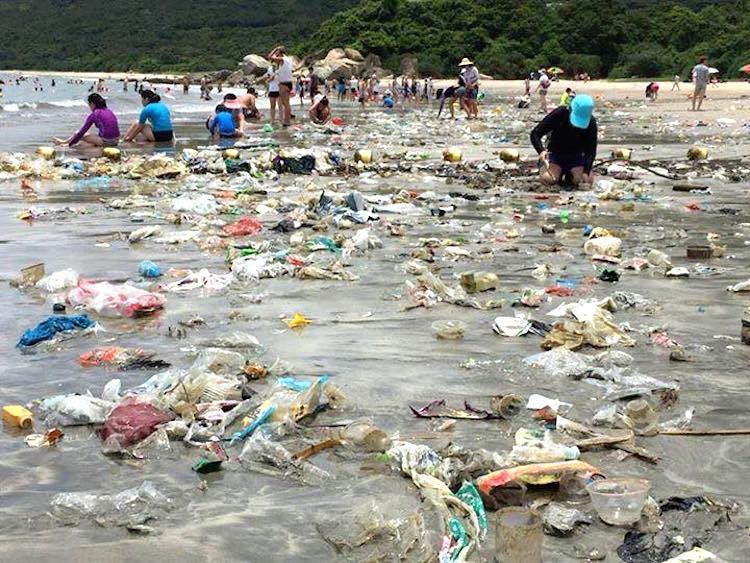
Introduction
Eight million tons of my and your plastic waste is dumped into the once-beautiful oceans of our world every year; it cannot continue indefinitely. Even the most remote tropical beaches, apparently clean and pristine, are littered with 21 plastic bits for every 50 grams of sand, according to researcher Nic Vanderzyl.
When microparticles are embedded in the atheromas in our arteries we have 4.5 times greater chance of dying from a cardiovascular event[9]; that's massive.
It's in the rain, and even in our table salt.
This page was last updated by Dr Bernard Preston on 6th April, 2023.
"We have a single mission; to protect and hand on the planet to the next generation."
President Francois Hollande, France.
We have reused Barbi-plastic; she adorns our worm farm to keep the rain out.
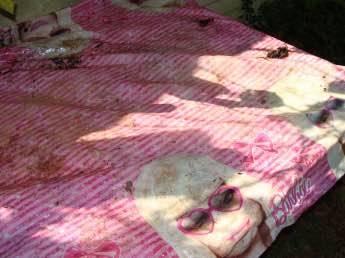
Let's be honest. Plastic has become so central to our culture that,
like dollars and euros we simply cannot wean ourselves
from it entirely; but could we stop loving it?
Actually that is a misquote; it is the love of money which is the root of all evil, and not filthy-lucre itself.
In similar vein it is our misuse of plastic that is the problem.
And it is a huge dilemma; big enough to destroy our civilization if we do not do something about it. Within a few short decades the weight of non-biodegradable synthetics in our seas will be greater than that of fish; already marine life is choking on our debris.
Right now plastic in the oceans of our fragile world makes up 25 percent of the weight of fish; it is already causing unimaginable devastation to marine-life.
Unless we do something right now, within a few short years our grandchildren, not to mention the next generations will be facing an uninhabitable-world; the impact on our environment is already shocking.
Rightly so, they will blame us; what are we going to do? Wean off plastic is our first responsibility; to them and to ourselves. Very soon sea salt and fish will be inedible. We simply cannot be ostriches and pretend otherwise.
Single use plastics
It's single-use plastics that should be first up in the firing line, and Canada aims to ban them by 2021[5]. As Prime Minister Justin Trudeau asks, how do you explain the dead whales washing up on beaches across the world, their stomachs filled with our crud to your children?
The ban is likely to include plastic straws, cutlery and plates. Let's each and every one just do it voluntarily without coercion. Is it ludicrous to suggest we should never again buy takeaway food wrapped in polystyrene?
Nestlé has announced that it is aiming for zero emissions, including those linked to the production of plastics by 2050. But as the fourth biggest planet-destroying company, that is not nearly ambitious enough to stop catastrophic climate change that is staring at us in the face.
Personally I've stopped buying Nestlé products; they are an unethical company.
Microplastics
Microplastics are bits that have broken down to less than half a centimetre in length; not so small. Research shows that substantial amounts are found both in our drinking water but much less in that from boreholes.(1)
Weaning off plastic in our drinking water is not simple; the very bottle that it comes in contributes. Those who harvest and drink the rain are the only people on the planet partially free from this scourge.
Yet Janice Brahney, reporting in the journal Science found that microplastics are in the global dust that is being spread by winds across continents; with larger particles settled on the earth by rain but the smaller ones are deposited during dry weather[2].
There are tiny amounts of plastic even in our rainwater reservoir; we cannot escape it totally no matter how hard we try.
"Plastic is falling out of the sky into everything."
- Prof Janice Brahney
The elephant in the room is what both these plastics and the toxic chemicals that adhere to them are doing to our health. A conference of scientists was held in Amsterdam in October, 2019 presenting the first evidence of health risks from micro and nano plastics[4].
"Nobody can deny anymore the potential danger of microplastics to our wellbeing.
This is perhaps the most important result of the Plastic Health Summit."
- Maria Westerbos, director of the Plastic Soup Foundation
Microbeads
Microbeads are substantially smaller particles of plastic that are routinely added to cosmetics and toothpaste as an exfoliant.
Previously exfoliants were made from natural products like apricot seeds or coconut husks; but plastic is cheaper.
We are weaning off plastic by avoiding using cosmetics and brushing our teeth primarily with bicarbonate of soda; and very tiny amounts of toothpaste.
They are far too small to be easily filtered out of our drinking water; we are consuming micro-beads daily at our peril. Is it any wonder that cancer and the autoimmune disease are taking off? It's time for you and me to wean off plastic.
Toothpaste
Manufacturers have yet to find a solution to the toothpaste dilemma. The only way we can wean off this plastic, is to use just a smidgen, and bicarbonate of soda instead as the abrasive; it helps to keep the mouth alkaline too, and protects the teeth. You only need a very small amount.
We now use bicarb as a deodorant and for toothpaste, reducing both plastic and metal tubes and containers.
Recent frightening research reveals how much plastic is in the human brain. Most of it, nearly half the weight of a credit card just in the frontal cortex comes from soft drink and water bottles.
Autopsies find plastic in all of the major filtering organs
WebMD reports that researchers from Arizona State University are finding plastic in every single one of the so-called filtering organs of our bodies; the lungs, liver and kidneys. They point to the threat not only of the chemicals themselves, but the way they would become irritants causing tumours in the same way that asbestos does.
The particles are so small that they are absorbed from the gut into the blood stream, and hence to every part of the body.
"It's impossible to completely protect ourselves from plastic ingestion.
Microplastics have been measured in tap and bottled water, and in the air that we breathe."
- Dr Rolf Halden and Dianna Cohen[3]
Plastic in the blood
Researchers reporting in Environmental International having found that 80 percent of a group of healthy individuals contained plastic particles in their blood. 50% of the individuals had PET, 36pc had polystyrene, and a quarter of the sample had polyethylene.
The plastic was being carried by immune cells inviting questions about how it might make us predisposed to disease[6].
Wean off plastic
Wean off plastic or, like money, is it our irresponsible use of hydrocarbons that causes the pollution of our seas? First and foremost is our mission to hand over our pristine planet to our children. Otherwise they will stomp on our graves and curse their parents.
It seems an impossible task; do away with shopping bags, credit cards, motor car parts, wrapping for food to keep it fresh you probably are asking? So am I.
The moment the farmer harvests a cauliflower or cabbage it begins to decay; atmospheric oxygen starts to do its work, just the way it was intended to.
The only problem is that they do not decay the way your cabbage does. Can one imagine a world full of brassicas that never spoil? Mountains of them piling up, uneaten, filling our dumps and the seas.
No, the Good Lord in His wisdom gave us oxygen to allow all natural products to decay and return to the earth. But Man, who created plastics is not so smart; not yet anyway.
But there is light at the end of the tunnel. Scientists have discovered bacteria that can break down some synthetics. But it's only the beginning and, unless we play our part, that of the academics will be too little.
Worse, it will be too late.
Current thinking is to
- refuse,
- reduce,
- reuse and
- recycle.
Let's look at them in turn.
Refusing to accept plastic bags at the till when you are shopping is the first small step. It means taking your own with you; that surely is not too much trouble to make sure your grandchild has a habitable world to live in.
Reducing is perhaps more difficult; it means refusing to purchase items that are wrapped in plastic. If it's a Barbie doll, then I would have no difficulties, but if it was the protection that keeps the oxygen from my broccoli, then I would have a troubled mind.
Perhaps it means going to the farmers' market where you know the vegetables were harvested either yesterday or early this morning. In addition you then you can be sure they weren't transported half way across the country in refrigerated trucks, contributing enormously to greenhouse gases.
It is only a notion, but I believe that eating in the main what's in season is healthier, but I have no research to back it up. Strawberries for Christmas means transporting them thousands of miles, and the single use packaging is a far cry from wean off plastic.
“I’m American. I believe in nuclear war, I eat red meat and I litter!"
- Geoff Bennett
Reuse is really not difficult; so many of the plastic bags can certainly be utilized for something different.
My granddaughter received an expensive Barbie doll gift for Christmas; it came wrapped in a plastic sheet that I found on the way to the garbage. It was of a high quality, thick and strong plastic, and perfect for covering my worm farm to keep the rain out.
I do hope the female worms are not forced into a state of depression as our women are, unable to compete against the most perfect body in the world.
Here's an update; it is now 5 years since I originally wrote this page and Barbie is still protecting my worms from the rain. She is looking a little tatty; it would appear that even the most beautiful women in the world age!
Reusing was easy, but recycling means washing the plastic; today I took half a dozen containers from the fridge, filled with decomposing food; that old spinach and celery went straight to the worms who will love them, but the bags were yuk. There was no way that I could recycle them without first rinsing them out. It took but a few seconds.
Likewise with plastic milk jugs and bags; rinse them out and send them to the recycling. If not for yourself, do it for your grandchildren.
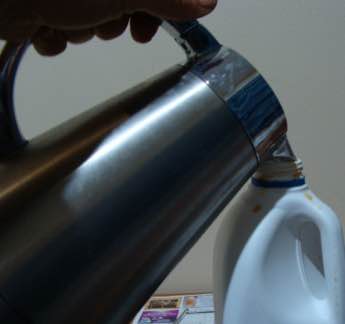
Before sending plastic for recycling one should make it at least vaguely clean. Pouring a little tea from the pot into the empty milk bottle, swishing it around, will remove most of the remains; then pour it into your cup; less wastage of the last few vestiges of dairy too.
Very roughly, plastic may be divided into
- LD which is light plastic bags like your bread would come in,
- PET like the clear plastic used to make water and cola bottles, and
- HD which would include heavy plastic lids.
And then there are problem plastics that no one wants. Currently a group in Durban, called the Pyrolysis Group, is taking this waste, adding glass chips and turning it into pavers.
Teabags
Researchers at McGill University found that one teabag releases an astounding 14.7 billion plastic particles into each cup of the beverage[7]. 90% is excreted but the remainder accumulates in the tissues of the body.
The only problem with progress is that it goes forwards, the Irish wag, Oscar Wilde once said. Clearly it's time to revert to loose tea and a strainer.
Backyard permaculture
Backyard permaculture means learning to work with nature rather than against it; using the oceans as a huge landfill for our garbage is one of the most destructive things we can ever do. It's as bad as polluting the air. Our children's children will curse us unless we learn somehow to wean off plastic.
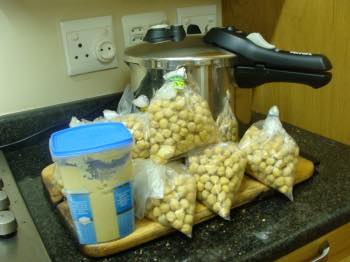
We will never wean off plastic in my opinion and whether we will ever learn to use it responsibly remains to be seen; I have my doubts. It's become so easy to toss it and humans are the laziest and most dirty creatures on the planet.
It will take a spiritual revival for us to learn to treat creation with respect.
Storing chickpeas in recycled plastic bags before freezing is really not difficult. That blue feta cheese tub contains our quick hummus.
If you don't have a modern stainless steel pressure-cooker, think about getting one; mainly because they save time, but also electricity.
Cooking takes one third of the time under pressure.
Weaning off plastic is going to be extremely difficult; it's more addictive than heroin.
Newsletter
Our newsletter is entitled "create a cyan zone" at your home, preserving both yourself and Mother Earth for future generations; and the family too, of course. We promise not to spam you with daily emails promoting various products. You may get an occasional nudge to buy one of my books.
Here are the back issues.
- Lifestyle and ideal body weight
- What are ultra-processed foods?
- Investing in long-term health
- Diseases from plastic exposure
- Intensive lifestyle management for obesity has limited value
- A world largely devoid of Parkinson's Disease
- The impact of friendly bacteria in the tum on the prevention of cancer
- There's a hole in the bucket
- Everyone is talking about weight loss drugs
- Pull the sweet tooth
- If you suffer from heartburn plant a susu
- Refined maize meal and stunting
- Should agriculture and industry get priority for water and electricity?
- Nature is calling
- Mill your own flour
- Bake your own sourdough bread
- Microplastics from our water
- Alternative types of water storage
- Wear your clothes out
- Comfort foods
- Create a bee-friendly environment
- Go to bed slightly hungry
- Keep bees
- Blue zone folk are religious
- Reduce plastic waste
- Family is important
- What can go in compost?
- Grow broad beans for longevity
- Harvest and store sunshine
- Blue zone exercise
- Harvest and store your rainwater
- Create a cyan zone at your home
Ecobrick sheds
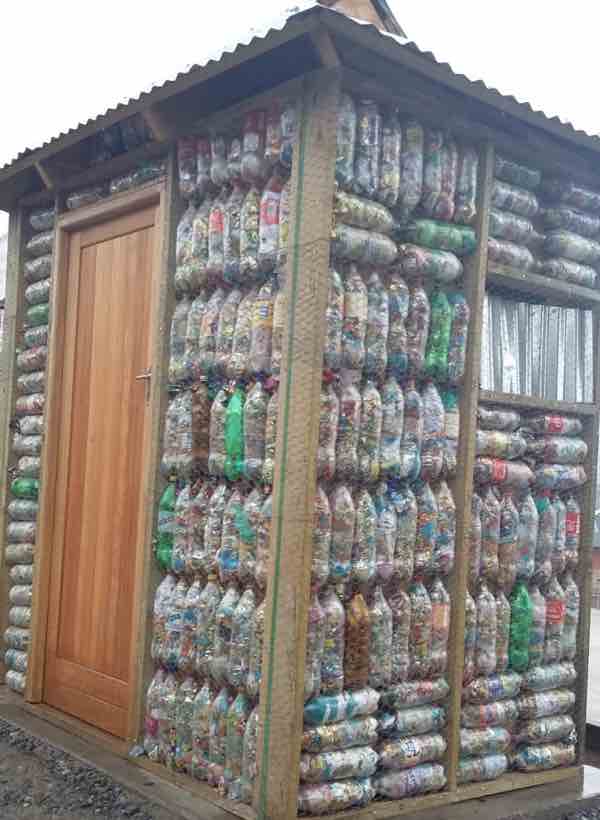
Imaginative people are finding new ways to deal with our waste. These cola bottles filled with plastic give work to people, reduce our need for bricks and provide a very useful way for disposing of junk. But how long will they last, exposed to sunshine?
Bernard Preston
Bernard Preston is a semi-retired DC with a passion for well-being, and preserving the pristine nature of our environment. Alas I don't really believe we will wean off plastic and one way or another the human race will self destruct in the next century or so; perhaps a lot sooner.
Will you do your bit for your children, if not for yourself? At least make every attempt to recycle and reuse the plastic that passes through your hands. Reducing by carrying shopping bags with us to the supermarket is not that difficult.
Perhaps my eighth book will be about inventive ways to save the planet. Number seven is besieged right now; read the first six? You won't be sorry. They are dirt cheap on your Kindle.
- Marine and freshwater microplastic research in South Africa
- Microplastics have moved into virtually every crevice on Earth
- Autopsies Show Microplastics in All Major Human Organs. Web: https://www.webmd.com/a-to-z-guides/news/20200817/autopsies-show-microplastics-in-all-major-human-organs?ecd=soc_tw_210318_cons_news_microplasticinorgans&linkId=100000034842017
- The first evidence of health risks from micro and nano plastics. Web: https://tinyurl.com/5n7vmr99
- Canada aims to ban single-use plastics by 2021
- Plastic particle pollution in human blood
- Plastic Teabags Release Billions of particles into each cup.
- How much plastic do you eat?
- Microplastic in atheromas and Cardiovascular events
When browsing use right click and Open Link in New Tab, or you may get a bad gateway signal.
Did you find this page interesting? How about forwarding it to a friendly book or food junkie? Better still, a social media tick would help.
- Bernard Preston homepage
- Nutritious choice foods
- Wean Off Plastic
Address:
56 Groenekloof Rd,
Hilton, KZN
South Africa
Website:
https://www.bernard-preston.com